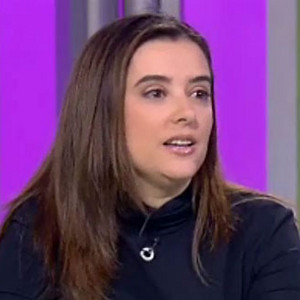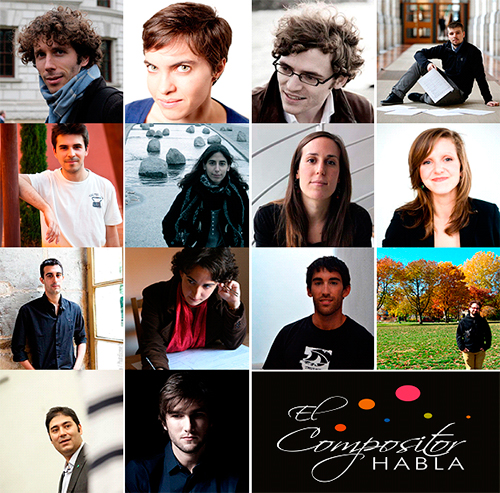Artistas
Howard Moody (Compositor)
Howard Moody | Howard Moody habla acerca de su ópera Sindbad
25/04/2014Taking advantage of his lastest stay in Brussels and the premiere of his opera "Sindbad" at La Monnaie last February, we spoke to composer Howard Moody in an informal setting. We have made an edited transcription of this informal conversation and we hope you find interesting what Howard has to say.
“they asked me to write another piece following the success of the Brussels Requiem project. They wanted a piece to be sung by four groups of children from six schools who had never sung before, two trained, youth choirs (La Maitrise and La Choraline), two soloists and an orchestra. And they gave me one word: they just said “Sindbad””
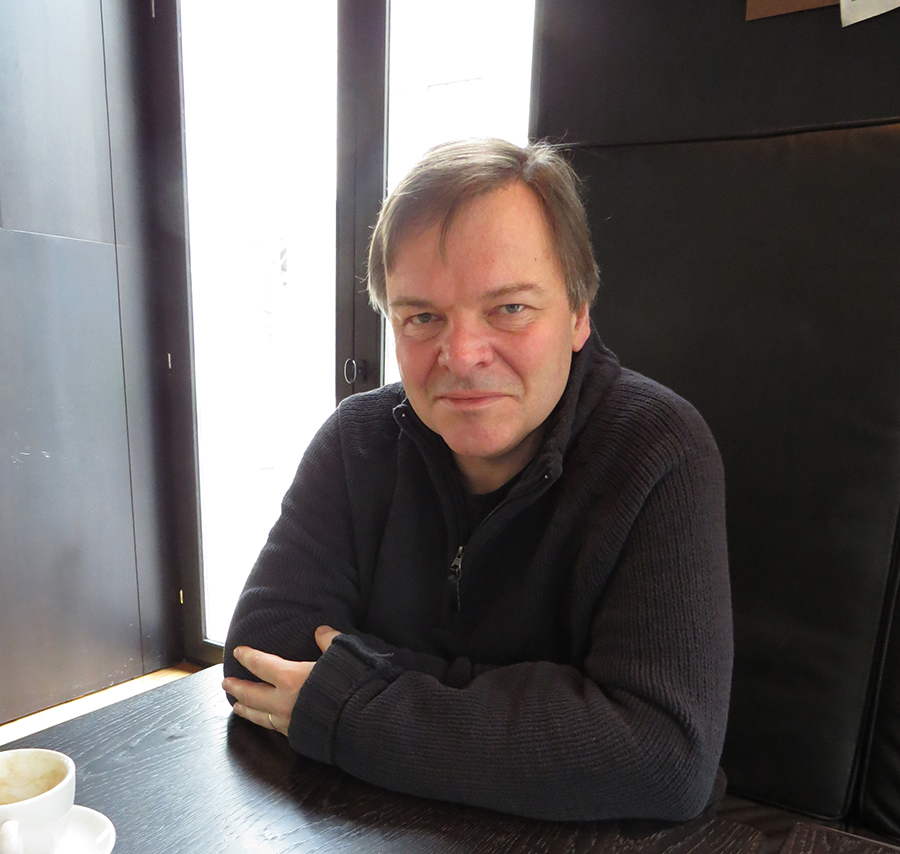
"There´s one thing that´s really significant about La Monnaie: you walk through the door and you know that the management team genuinely understands and supports the idea behind big projects like Sindbad that involve “the people”. It´s not an inconvenience. It´s not something that they think they should do but hope will go away quickly. And for me that´s the visionary thing."
“they asked me to write another piece following the success of the Brussels Requiem project. They wanted a piece to be sung by four groups of children from six schools who had never sung before, two trained, youth choirs (La Maitrise and La Choraline), two soloists and an orchestra. And they gave me one word: they just said “Sindbad””
1. Ruth Prieto: What can you tell us about the Sindbad project?
Howard Moody: Well it´s a commission by La Monnaie. In October 2012, they asked me to write another piece following the success of the Brussels Requiem project. They wanted a piece to be sung by four groups of children from six schools who had never sung before, two trained, youth choirs (La Maitrise and La Choraline), two soloists and an orchestra. And they gave me one word: they just said “Sindbad”. Please write a piece about Sindbad. And that was the only thing I was told to do. But it was enough because it told me who the piece was for and what the theme of the project would be. So, within that, I was completely free to write what I wanted. They wanted me to write the libretto, as well as the music. This meant that it was entirely my choice as to how the score turned out. They wanted the vocal score to be finished within six months. Then I orchestrated it. I came over in May 2013 and played what I had written. Before that, I had a couple of meetings with the artistic direction and I shared with them the ideas that I had. It was really positive to be able to discuss something freely. There was no censorship. There was just a genuine feeling from the opera house that they wanted this to be a success and that they wanted to understand what it was to be part of this process. For them, it was also a chance to open their doors to a new audience: the children, the children´s parents. We started rehearsing the piece in August 2013 with the trained choirs. Then, in September, a team of collaborateurs started going into the schools twice a week to show the children the music and to stage the music. Thierry, the director, and myself as conductor, also took part in some of these sessions. We did a lot of workshops and rehearsals to put the piece on the stage. Now we´re in the last week. But if you consider the scale of the project, it´s quite a short period of time to write a whole score and make everybody focused on what it is
2. Ruth Prieto: And is this the only thing that you were doing? Was it a case of full-time dedication to the project?
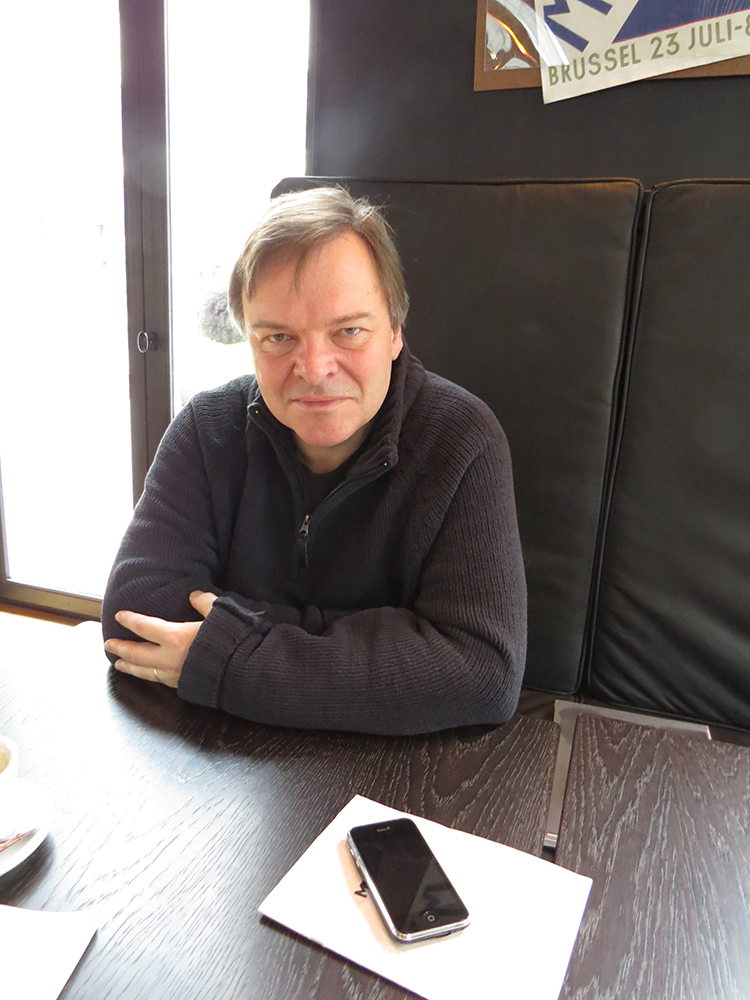 Howard Moody: I wish. No. I play music. I am a musician. I have three children. My life is very full. But what is special about composing a big piece and writing the libretto is the possibility of crafting ideas and letting them develop. I also find time to work when everybody else is asleep, at three o´clock in the morning, for example. Nobody asks you to do anything at three o´clock in the morning. Also, I´m quite disciplined and there are days when I´m really focused.
Howard Moody: I wish. No. I play music. I am a musician. I have three children. My life is very full. But what is special about composing a big piece and writing the libretto is the possibility of crafting ideas and letting them develop. I also find time to work when everybody else is asleep, at three o´clock in the morning, for example. Nobody asks you to do anything at three o´clock in the morning. Also, I´m quite disciplined and there are days when I´m really focused.
3. Ruth Prieto: This is not your first opera for a young audience. Why this interest in educational projects?
4. Ruth Prieto: What does music contribute to education?
Teachers who are not confident to share music are very grateful to these arts projects because, for them, they present an opportunity for assistance from experts in the field. The feedback from teachers is that projects of this kind have a big impact on the group. The “ritual experience” shared during workshops and rehearsals make the group more willing to learn other stuff, do their maths, do their science, etc.
I remember as a child that sometimes I absolutely hated music because the teacher would come in and tell me to do this and shout “you must do that because it´s good for you”. I can still feel it in my body. But when the message came to me unconditionally from a musician, from somebody active in music, then that was quite different.
Although there are signs of change in the relationship between big cultural institutions and schools, the repertoire has not caught up. I mean, just giving somebody the chance to hear somebody else perform … that´s not really enough … young people want to take part … ask yourself how long a child wants to be talked to? Two minutes, one and a half minutes, one minute, not at all …
5. Ruth Prieto: Which characteristics define you best as a composer?
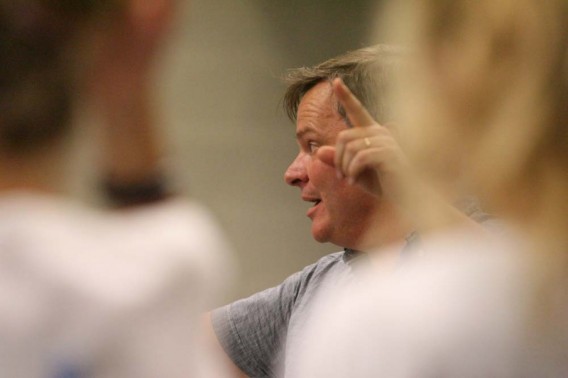 Howard Moody: Probably you have to ask somebody else, probably they know the answer. It´s a very hard question to answer. Composing is a part of my musical life, which is strange in a way because I used to think that composers had to be dead or that people who deserved to compose had to be at least as talented as Bach, Beethoven or the great songwriters.
Howard Moody: Probably you have to ask somebody else, probably they know the answer. It´s a very hard question to answer. Composing is a part of my musical life, which is strange in a way because I used to think that composers had to be dead or that people who deserved to compose had to be at least as talented as Bach, Beethoven or the great songwriters.
For projects like Sindbad, I´ve learned from experience of playing a lot of what I would call “great” music, of being involved in theatre music and of using the whole dramatic structure of theatre. But also I´ve had wonderful opportunities to improvise, particularly when working with John Surman, the jazz saxophone player. So, when writing for children´s voices, I think that I´ve been inspired by the music of Bach mixed with playing with John Salmon mixed with a bit of Olivier Messiaen. What´s important are the harmonic patterns and the rhythmic emphasis behind the music. Bach´s music has this and it´s also the starting point for jazz musicians but it´s not like in the pop world where the “beat” is always clear. I´m not so interested in the beat because I think that the beat comes underneath the music (although Sindbad has quite a lot of Arabic percussion). I suppose that I am an improviser but that I am also very flexible to the group that wants the piece. So, in the case of the Sinbad project, the group involved (children, same or similar age group, same or similar mix of cultures) tells me immediately the limitations and the possibilities. So you don´t write too many high notes, you don´t write too many melodies that will make their voices tired after five minutes … you make sure that the complexity is elsewhere in the music.
So maybe the easiest answer to your question is that, for me, the vocal line or the melody is a really important starting point.
6. Ruth Prieto: What are your main obsessions when working?
But in other pieces that I´ve written, I think that the harmonic world (chords and harmonic structures) are also a kind of obsession … it´s a sort of an improviser´s thing as well … sometimes a chord sequence is really positive … you kind of know where you are.
7. Ruth Prieto: Can you define contemporary and in which way you are contemporary?
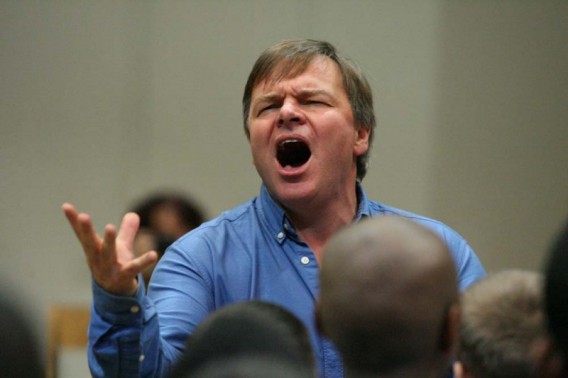 Howard Moody: The inspiration for Sindbad was a radio documentary. I was completely stuck with the libretto for Sindbad. I didn´t know what to write, how to write it, who this character of Sindbad was, etc. Anyway, I was driving along listening to this radio programme by John Simpson, a BBC reporter who had covered the chemical attack in Halabja, northern Iraq, in March 1988 and who had returned to the scene 25 years later. He was talking to a man who had survived the attack because on the day of the attack he had away. He was describing how he had lost 24 of his friends and family and how he had gone into Haladjba and buried them the next day. He said that it had been the beginning of his journey to heal the pain but that the journey would take a hundred years. At that point, I stopped the car: this was Sindbad, the character who is constantly going on journeys without fear (or who finds a way through fear if it comes). When John Simpson asked this man what the experience had been like, all the man said was “But of course I went in, but of course I did that …”. There was this wonderful optimism. It´s the classic Sindbad story. Every time Sindbad goes on a voyage, he comes back and he looks after his home life as well as his adventure. This was the contemporary story that I used. The story starts in Baghdad, the city of peace in the “One Thousand and One Nights”. In the middle of Baghdad, a policeman is cleaning up a statue of Scheherazade. He says: “she´s crying hard tears for us … she is our inspiration.”. What I want to express is people going about their everyday lives, people telling us how they are feeling.
Howard Moody: The inspiration for Sindbad was a radio documentary. I was completely stuck with the libretto for Sindbad. I didn´t know what to write, how to write it, who this character of Sindbad was, etc. Anyway, I was driving along listening to this radio programme by John Simpson, a BBC reporter who had covered the chemical attack in Halabja, northern Iraq, in March 1988 and who had returned to the scene 25 years later. He was talking to a man who had survived the attack because on the day of the attack he had away. He was describing how he had lost 24 of his friends and family and how he had gone into Haladjba and buried them the next day. He said that it had been the beginning of his journey to heal the pain but that the journey would take a hundred years. At that point, I stopped the car: this was Sindbad, the character who is constantly going on journeys without fear (or who finds a way through fear if it comes). When John Simpson asked this man what the experience had been like, all the man said was “But of course I went in, but of course I did that …”. There was this wonderful optimism. It´s the classic Sindbad story. Every time Sindbad goes on a voyage, he comes back and he looks after his home life as well as his adventure. This was the contemporary story that I used. The story starts in Baghdad, the city of peace in the “One Thousand and One Nights”. In the middle of Baghdad, a policeman is cleaning up a statue of Scheherazade. He says: “she´s crying hard tears for us … she is our inspiration.”. What I want to express is people going about their everyday lives, people telling us how they are feeling.
8. Ruth Prieto: Is there any connection between your Sindbad and what is happening in Syria?
Howard Moody: The first rehearsal in August 2013 coincided with the week in which we were all watching millions of people coming out of Syria. There was a real energy in the room that the opera was a mirror of exactly what was happening. Of course, I´m not a TV cameraman. I´m not trying to show a replay of something. Nor am I trying to say that if you write an opera it makes everything OK. But it´s an energetic thing … if you do anything creative, you´re affected by what´s going on around you.
9. Ruth Prieto: What are you working on now? What comes after Sindbad?
Howard Moody: I´m writing my sixth piece for the London Symphony Orchestra, which, like the other five, I will also be conducting. These are projects in which groups of young people from around London participate. We improvise around a theme. Then I write some music for the orchestra. They play their music between the improvisations and what happens is a very powerful “coming together” of styles of music. It´s fascinating for me to see how the body language of the professional musicians changes when they find themselves on stage with something really contemporary … “contemporary” in the deepest sense of the word: in other words not contemporary because somebody has decided that it is the contemporary thing but rather “contemporary” because it´s something that´s living and dangerous.
I´ve also been asked to write choral music. And I´m working on a piece around the Magna Carta, as well as a creative a project around Nelson Mandela. So here is another case of creating something that reflects a happening in the real world.
10. Ruth Prieto: So, you´re very interested in what´s happening in the world right now?
Howard Moody: You can´t get away from that. It´s not my task to express that literally. But it´s about finding reasons to make music, reasons to sing, things that motivate groups or that focus them, particularly if you´re working with people who don´t have a previous idea of what music is. I think they have to feel connected with something. But nothing has changed. It was the same in Verdi´s time when he was writing operas … his themes were much more specifically political than mine. Stories like Nabucco reflected exactly what was happening on his front door. The opera house was the safe place to explore those themes. The music was sung by everybody. There was no divide between the Pensiero inside the theatre and the people outside. The same is true of Lacrimosa in Verdi´s Requiem … thousands and thousands of people sang it on the streets … and that´s what´s exciting about writing for a whole group of kids in the city: there´s this possibility of making immediate folk music because they´re singing it in the playground, they´re signing it when they get home, etc. What more could a composer want?
11. Ruth Prieto: Anything else to say?
Howard Moody: There´s one thing that´s really significant about La Monnaie: you walk through the door and you know that the management team genuinely understands and supports the idea behind big projects like Sindbad that involve “the people”. It´s not an inconvenience. It´s not something that they think they should do but hope will go away quickly. And for me that´s the visionary thing. When the Brussels Requiem happened, this type of project was very new to them. But they supported it completely. They gave full artistic support to the idea that theatres are there for everybody. It is easy to say that theatres are there for everybody but it is something else again to make it real through a project and by creating a piece. There´s such a difference between talking about it and actually doing it. It´s wonderful what´s going on here at la Monnaie. A piece like Brussels Requiem does not have to be done only by the group that did it the first time. You can reinvent a piece for any group singing it. It could be adults, as well as children. The Brussels Requiem was such a big task to put on. I think it would be exciting it if it were opened up to new interpretations.
(Photos 3 and 4 courtesy of La Monnaie)
2. Ruth Prieto: And is this the only thing that you were doing? Was it a case of full-time dedication to the project?
 Howard Moody: I wish. No. I play music. I am a musician. I have three children. My life is very full. But what is special about composing a big piece and writing the libretto is the possibility of crafting ideas and letting them develop. I also find time to work when everybody else is asleep, at three o´clock in the morning, for example. Nobody asks you to do anything at three o´clock in the morning. Also, I´m quite disciplined and there are days when I´m really focused.
Howard Moody: I wish. No. I play music. I am a musician. I have three children. My life is very full. But what is special about composing a big piece and writing the libretto is the possibility of crafting ideas and letting them develop. I also find time to work when everybody else is asleep, at three o´clock in the morning, for example. Nobody asks you to do anything at three o´clock in the morning. Also, I´m quite disciplined and there are days when I´m really focused.3. Ruth Prieto: This is not your first opera for a young audience. Why this interest in educational projects?
“the good thing about being commissioned to write a piece like Sindbad is that it gives you the chance to write music that will be heard. It´s the possibility to write music that will affect thousands of people.”
Howard Moody: Well I think part of it is well about being asked as a composer. If you are asked to write a piece, you probably will. Also, the good thing about being commissioned to write a piece like Sindbad is that it gives you the chance to write music that will be heard. It´s the possibility to write music that will affect thousands of people. You have 250 people learning the music and being involved in the piece. Over many years, the impact of that will be huge: all of the performances are sold out. How many new commissions can claim that? Some people think that just because children are involved in something, then it´s something different. But for me, that is absolutely not the case. I think it´s the most fantastic way of creating a new form of theatre. In normal opera, you typically have four to six individual adults telling a story of human conflict and resolution. In Sindbad, it is the group that is telling the story. The composer puts the story in their hands (even if the two adults help the narration along). Anyway, for me, there is nothing better than being asked to write a piece that you know will be performed and in which you know that everyone will feel involved. Whether they like it or not …. that´s a detail. You can´t start with that. You just have to have a go. The project was also special for me also because I was conducting the piece as well … it was me writing the music and it was me pulling everything together in the end. Mahler used to conduct his own symphonies. Stravinsky used to conduct his music, too. Don´t get me wrong: I´m not comparing my abilities to Stravinsky but I think that the model of an “active” composer is a very particular thing. I am a performing musician as well as a composer and I think that it´s a wonderful opportunity to be responsible for every note, not only on paper but also when the piece is performed in front of an audience.4. Ruth Prieto: What does music contribute to education?
“Scientists say that we hear something like 10% of sound through our ears and that the rest is captured through vibration”
Howard Moody: What´s really moving for me is going into a school where there is no culture of music-making and then having the opportunity to work with groups of children without having to read or write anything. They´re free. Everything is open. We don´t tell them anything. But what I have found is that, in the first five minutes of a project, there is often a transformation: the kids seem to realize that this act of making music together, the physical act of making sound, is very powerful. And it´s a feeling that grows over the project. Scientists say that we hear something like 10% of sound through our ears and that the rest is captured through vibration. Why else are profoundly deaf people receptive to music? We receive a lot of energy from acoustic music-making and live performances (perhaps we don´t really understand how much). And I think that this is a very profound experience for a young child. And then it´s also fun. And once it stops being fun, there is the focus of the performance. The most important thing is not to “dumb things down”. In other words, never present young people with something childish. Rather, offer them the best that you know (whatever “best” is). Offer them something really substantial and then, in my experience, they´ll rise to it. But if you give them a few nursery rhymes, they´re not going to give you their hearts because that´s a different part of their life: nursery rhymes were sung to them when they were small children … they know all that stuff.Teachers who are not confident to share music are very grateful to these arts projects because, for them, they present an opportunity for assistance from experts in the field. The feedback from teachers is that projects of this kind have a big impact on the group. The “ritual experience” shared during workshops and rehearsals make the group more willing to learn other stuff, do their maths, do their science, etc.
I remember as a child that sometimes I absolutely hated music because the teacher would come in and tell me to do this and shout “you must do that because it´s good for you”. I can still feel it in my body. But when the message came to me unconditionally from a musician, from somebody active in music, then that was quite different.
Although there are signs of change in the relationship between big cultural institutions and schools, the repertoire has not caught up. I mean, just giving somebody the chance to hear somebody else perform … that´s not really enough … young people want to take part … ask yourself how long a child wants to be talked to? Two minutes, one and a half minutes, one minute, not at all …
5. Ruth Prieto: Which characteristics define you best as a composer?
 Howard Moody: Probably you have to ask somebody else, probably they know the answer. It´s a very hard question to answer. Composing is a part of my musical life, which is strange in a way because I used to think that composers had to be dead or that people who deserved to compose had to be at least as talented as Bach, Beethoven or the great songwriters.
Howard Moody: Probably you have to ask somebody else, probably they know the answer. It´s a very hard question to answer. Composing is a part of my musical life, which is strange in a way because I used to think that composers had to be dead or that people who deserved to compose had to be at least as talented as Bach, Beethoven or the great songwriters. For projects like Sindbad, I´ve learned from experience of playing a lot of what I would call “great” music, of being involved in theatre music and of using the whole dramatic structure of theatre. But also I´ve had wonderful opportunities to improvise, particularly when working with John Surman, the jazz saxophone player. So, when writing for children´s voices, I think that I´ve been inspired by the music of Bach mixed with playing with John Salmon mixed with a bit of Olivier Messiaen. What´s important are the harmonic patterns and the rhythmic emphasis behind the music. Bach´s music has this and it´s also the starting point for jazz musicians but it´s not like in the pop world where the “beat” is always clear. I´m not so interested in the beat because I think that the beat comes underneath the music (although Sindbad has quite a lot of Arabic percussion). I suppose that I am an improviser but that I am also very flexible to the group that wants the piece. So, in the case of the Sinbad project, the group involved (children, same or similar age group, same or similar mix of cultures) tells me immediately the limitations and the possibilities. So you don´t write too many high notes, you don´t write too many melodies that will make their voices tired after five minutes … you make sure that the complexity is elsewhere in the music.
So maybe the easiest answer to your question is that, for me, the vocal line or the melody is a really important starting point.
6. Ruth Prieto: What are your main obsessions when working?
“In my experience, young people love atonal music (if it has a clear reason and a clear dramatic meaning) and they love tonal music as a contrast to that … and the challenge is trying to hold their musical imagination all the time.”
Howard Moody: Well, hopefully, contrast. In opera, the great thing on stage is that you can have melodies that are very simple but then you can let the orchestra go completely mad … I mean you can go anywhere. In my experience, young people love atonal music (if it has a clear reason and a clear dramatic meaning) and they love tonal music as a contrast to that … and the challenge is trying to hold their musical imagination all the time.But in other pieces that I´ve written, I think that the harmonic world (chords and harmonic structures) are also a kind of obsession … it´s a sort of an improviser´s thing as well … sometimes a chord sequence is really positive … you kind of know where you are.
7. Ruth Prieto: Can you define contemporary and in which way you are contemporary?
 Howard Moody: The inspiration for Sindbad was a radio documentary. I was completely stuck with the libretto for Sindbad. I didn´t know what to write, how to write it, who this character of Sindbad was, etc. Anyway, I was driving along listening to this radio programme by John Simpson, a BBC reporter who had covered the chemical attack in Halabja, northern Iraq, in March 1988 and who had returned to the scene 25 years later. He was talking to a man who had survived the attack because on the day of the attack he had away. He was describing how he had lost 24 of his friends and family and how he had gone into Haladjba and buried them the next day. He said that it had been the beginning of his journey to heal the pain but that the journey would take a hundred years. At that point, I stopped the car: this was Sindbad, the character who is constantly going on journeys without fear (or who finds a way through fear if it comes). When John Simpson asked this man what the experience had been like, all the man said was “But of course I went in, but of course I did that …”. There was this wonderful optimism. It´s the classic Sindbad story. Every time Sindbad goes on a voyage, he comes back and he looks after his home life as well as his adventure. This was the contemporary story that I used. The story starts in Baghdad, the city of peace in the “One Thousand and One Nights”. In the middle of Baghdad, a policeman is cleaning up a statue of Scheherazade. He says: “she´s crying hard tears for us … she is our inspiration.”. What I want to express is people going about their everyday lives, people telling us how they are feeling.
Howard Moody: The inspiration for Sindbad was a radio documentary. I was completely stuck with the libretto for Sindbad. I didn´t know what to write, how to write it, who this character of Sindbad was, etc. Anyway, I was driving along listening to this radio programme by John Simpson, a BBC reporter who had covered the chemical attack in Halabja, northern Iraq, in March 1988 and who had returned to the scene 25 years later. He was talking to a man who had survived the attack because on the day of the attack he had away. He was describing how he had lost 24 of his friends and family and how he had gone into Haladjba and buried them the next day. He said that it had been the beginning of his journey to heal the pain but that the journey would take a hundred years. At that point, I stopped the car: this was Sindbad, the character who is constantly going on journeys without fear (or who finds a way through fear if it comes). When John Simpson asked this man what the experience had been like, all the man said was “But of course I went in, but of course I did that …”. There was this wonderful optimism. It´s the classic Sindbad story. Every time Sindbad goes on a voyage, he comes back and he looks after his home life as well as his adventure. This was the contemporary story that I used. The story starts in Baghdad, the city of peace in the “One Thousand and One Nights”. In the middle of Baghdad, a policeman is cleaning up a statue of Scheherazade. He says: “she´s crying hard tears for us … she is our inspiration.”. What I want to express is people going about their everyday lives, people telling us how they are feeling. 8. Ruth Prieto: Is there any connection between your Sindbad and what is happening in Syria?
Howard Moody: The first rehearsal in August 2013 coincided with the week in which we were all watching millions of people coming out of Syria. There was a real energy in the room that the opera was a mirror of exactly what was happening. Of course, I´m not a TV cameraman. I´m not trying to show a replay of something. Nor am I trying to say that if you write an opera it makes everything OK. But it´s an energetic thing … if you do anything creative, you´re affected by what´s going on around you.
9. Ruth Prieto: What are you working on now? What comes after Sindbad?
Howard Moody: I´m writing my sixth piece for the London Symphony Orchestra, which, like the other five, I will also be conducting. These are projects in which groups of young people from around London participate. We improvise around a theme. Then I write some music for the orchestra. They play their music between the improvisations and what happens is a very powerful “coming together” of styles of music. It´s fascinating for me to see how the body language of the professional musicians changes when they find themselves on stage with something really contemporary … “contemporary” in the deepest sense of the word: in other words not contemporary because somebody has decided that it is the contemporary thing but rather “contemporary” because it´s something that´s living and dangerous.
I´ve also been asked to write choral music. And I´m working on a piece around the Magna Carta, as well as a creative a project around Nelson Mandela. So here is another case of creating something that reflects a happening in the real world.
10. Ruth Prieto: So, you´re very interested in what´s happening in the world right now?
Howard Moody: You can´t get away from that. It´s not my task to express that literally. But it´s about finding reasons to make music, reasons to sing, things that motivate groups or that focus them, particularly if you´re working with people who don´t have a previous idea of what music is. I think they have to feel connected with something. But nothing has changed. It was the same in Verdi´s time when he was writing operas … his themes were much more specifically political than mine. Stories like Nabucco reflected exactly what was happening on his front door. The opera house was the safe place to explore those themes. The music was sung by everybody. There was no divide between the Pensiero inside the theatre and the people outside. The same is true of Lacrimosa in Verdi´s Requiem … thousands and thousands of people sang it on the streets … and that´s what´s exciting about writing for a whole group of kids in the city: there´s this possibility of making immediate folk music because they´re singing it in the playground, they´re signing it when they get home, etc. What more could a composer want?
11. Ruth Prieto: Anything else to say?
Howard Moody: There´s one thing that´s really significant about La Monnaie: you walk through the door and you know that the management team genuinely understands and supports the idea behind big projects like Sindbad that involve “the people”. It´s not an inconvenience. It´s not something that they think they should do but hope will go away quickly. And for me that´s the visionary thing. When the Brussels Requiem happened, this type of project was very new to them. But they supported it completely. They gave full artistic support to the idea that theatres are there for everybody. It is easy to say that theatres are there for everybody but it is something else again to make it real through a project and by creating a piece. There´s such a difference between talking about it and actually doing it. It´s wonderful what´s going on here at la Monnaie. A piece like Brussels Requiem does not have to be done only by the group that did it the first time. You can reinvent a piece for any group singing it. It could be adults, as well as children. The Brussels Requiem was such a big task to put on. I think it would be exciting it if it were opened up to new interpretations.
(Photos 3 and 4 courtesy of La Monnaie)
Destacamos ...
Nueva Sección Directorio
dedicada a la promoción de compositores, intérpretes, instituciones y editoriales.

dedicada a la promoción de compositores, intérpretes, instituciones y editoriales.


